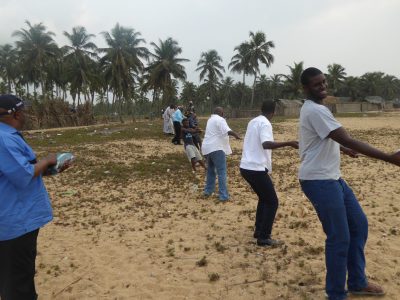The 65th PBF course took place in Cotonou from 15 to 27 January 2018 with 32 participants from Guinea Conakry (12), Senegal (10), Madagascar (4), Chad (2), CAR (2x), Cameroon (1) and Burundi (1). Herewith the detailed course report (rapport du cours).
We had also the pleasure to welcome the 2000th participant to the PBF courses since 2007 and this was El Hadji Ndiaga GUEYE, the RBF portal expert from the Senegal programme.
The daily course evaluations and the final evaluation of the course were favorable compared to the previous course held in Cotonou in August 2017. The impact of the 65th PBF course has been reflected in the good quality of the action plans carried out by the groups of countries (see the detailed course report).
Two participants obtained a certificate of distinction with a score of 90% or higher for the end-of-training test. They were Dr. Mohamed CAMARA, who works in the project FBR pilot of Mamou in Guinea and Dr. Florent Eric RABEARITSOA, who works for Madagascar’s FBR program in the Ministry of Health.
- Senegal
The RBF programme in Senegal began in 2012 in two regions and the results were deemed satisfactory, which led the Ministry to decide to expand the RBF program to four more regions. Nevertheless, a number of bottlenecks were highlighted by the course participants and, notably, the low consumption of the RBF budget, the lack of performance contracts at the central and regional levels, the poor functioning of the regional CDV Agencies, and the lack of an RBF specialist at the central level. The Senegal group in Cotonou evaluated the purity of the RBF program at 56%.
Recommendations
- Expand the range of accredited drug and essential product distributors to which providers must have free access;
- Improve the fiduciary management of the RBF Program ;
- Update the RBF procedures manual ;
- Train a critical mass of PBF actors ;
- Expand the performance contracts to all actors at the central and regional level ;
- Improve the institutional set-up at regional level
- Make exceptions (derogations) in the Law to strengthen the autonomy of health facilities and the institutional anchoring at the regional level (CRG-AVI);
- Sustainability: Create a legal and financial framework that allows the purchase of performance through already existing government input budget lines ;
- Sustainability: Set up regional CDV Agencies and integrate them into the already existing CRG-AVI to play the role of contracting and verification agencies ;
- Establish district data validation committees.
2. Chad
The two participants to the course, work in two districts, which already benefit from a Swiss Cooperation RBF-related project. The participants identified the following problems :
- The feasibility score for the PBF program is 46%, below the standard of 80% ;
- The current RBF project has a budget of US $ 2.03 / year/capita that does not meet the PBF standard of US $ 4 / year/capita;
- There is a monopoly on the distribution of inputs, which causes stock outs such as for drugs;
- Health facilities are not allowed to set their cost recovery tariffs, which causes black market effects and poor quality of care in public health facilities ;
- There is a tendency in Chad towards a centralization of functions and decisions;
- There is no independent CDV Agency. The role of the CDV Agency is played combined by the project team and the regulatory authorities at the peripheral level. The project team is also the payer.
Recommendations
At the Ministry of Public Health
- Advocate for the budget increase to the health sector and dedicate already existing input budget lines for the PBF program ;
- Liberalize the distribution channels for inputs ;
- Allow health facilities to set their own cost-recovery tariffs ;
- Separate functions at all levels;
At the District Support Project of Yao and Danamadji
- Respect the PBF best practices and improve the PBF design in order to achieve a feasibility score equal or above 80%.
3. Guinea
Among the priority interventions of the PNDS 2015-2024, PBF is identified as one of the reform approaches to improve the overall performance of the health system towards reaching the Universal Health Coverage in Guinea (2024).
There is a very favorable environment for the introduction of PBF in Guinea such as : (i) Good political will and initiative to develop a unique PBF approach under the leadership of the MOH; (ii) A PBF pre-pilot project being implemented in the health district of Mamou since 2016 showing encouraging results ; (iii) There is a growing interest of several technical and financial partners for PBF, and the number of key stakeholders trained in PBF is growing. There is already the informal cost recovery of fees among the population, but which needs to be formalized in order to generate enough health facility income to produce quality services.
Yet there are also weaknesses in the design of the current PBF program such as:
- A too limited number of indicators in the primary and hospital packages.
- A too rigid use of PBF subsidies following standard ratios instead of applying the indices management tool approach ;
- Performance contracts have not yet been developed at all levels.
- There are not yet district validation teams ;
- The Central Medical Stores still monopolizes the distribution of the essential drug;
- User fees tariffs are imposed from above ;
- there is not yet an independent CDV Agency ;
- The mapping and rationalization of health facility catchment areas is not yet done ;
- The packages do not contain the PBF equity indicators
- There is not yet a well-organized PBF Unit at the central level.
The participants to the Cotonou course propose to organize conferences to solve the above design problems, to create exemptions in the Law for the PBF health facilities to become more autonomous and to organize more PBF courses. At Mamou district level the group proposes to set up a district validation committee and to carry out the mapping and rationalization of the health facilities.
4. Cameroon
The PBF programme in Cameroon covers 50% population (around 11.5 million). The PBF programme will extend by 20% of the population per year from 2018 onwards.
Recommendations
- Strengthen the coaching in the use of the PBF tools such as the business plan and the indices management tool and change the public management mindsets towards greater transparency ;
- Select new health facility staff members and assure that they are not selected based on ethnic divides ;
- District Health Management Team must become more involved in PBF and assure the good functioning of the District Validation Committees.
5. Burundi
After pilots were conducted in 11 of the 17 provinces in Burundi since 2005 by CORDAID and other partners, PBF was scaled up to the national level in 2010. This was the beginning of a phase of strong national ownership characterized by the integration of PBF into the national health policy, a mix of PBF and free health care indicators for children under 5 and pregnant women. Currently, 50% of the PBF budget is financed by the State through a budget line dedicated to PBF and the national PBF Unit mobilizes the remaining external resources from several partners. Several studies showed favorable results.
External monitoring missions for the implementation of the PBF (the MOH, World Bank, EU, different bilateral cooperation’s) were conducted in 2012 and in 2014. After the deterioration of the political context, these missions discontinued after 2014. The gaps and weaknesses identified in the scaling up and for which corrective actions are necessary remained unanswered. Problems in the design remain such as the rigidity of the user fee setting, the absence of quality improvement bonuses and the absence of the PBF equity indicators as well as that public and private providers are not treated equally. A detailed action plan to solve the above problems is available in this report.
6. Madagascar
The Ministry of Public Health has initiated several PBF pilots since 2013, funded by UNICEF, AFD, and the World Bank. After two years of implementation of PBF in the pilot districts, a review took place, and the Ministry committed itself to pursue PBF and to a scale up with the support of the World Bank.
The feasibility score for Madagascar’s PBF program was evaluated by the participants at 68%. The main problem identified (killing assumption!) is the too small budget per person per year of only US $ 2.00 (far below the minimum of US $ 4.00). In addition, there are problems with the monopoly of the Central Medical Stores for the supply of inputs to the government health facilities; the non-respect of the separation of functions between regulator and provider and; the lack of a policy for the sustainability of the financing of PBF activities.
Thus, the group proposes actions to improve the design of the national PBF program as well as to advocate for more sustainability of the program by i. Providing budget lines for PBF activity in the government finance law of 2019; ii. Transforming non-productive government budget lines into PBF budget lines. The group also identified several elements of derogations needed from existing laws to advance the PBF program implementation.
The development of the Madagascar PBF manual is underway and the group intends to integrate their Cotonou proposals into the national manual.
7. The Central African Republic
Several difficulties have been noted within the tertiary hospital “Amitié” in Bangui, such as a lack of hygiene, the poor reception of patients, unmotivated staff, high maternal mortality and the inadequate hospital revenues also created by the informal collection of fees by staff. In view of these problems, the CAR group opts for the integration of the Hospital into the Results-Based Financing (RBF) program
Recommendations:
- Advocate for a waiver so that existing government hospital budget lines are directly transferred to the hospital account based on performance ;
- Empower the management of the hospital ;
- Introduce the indices management tool ;
- Revise the obsolete cost recovery tariffs and stop informal collection of fees ;
- Retrocede the management of the drug sales unit that now operates in a parallel fashion towards the hospital ;
- Decentralize the power of the management towards various autonomous department within the hospital ;
- Organize a training seminar for the hospital managers on the RBF management tools.
- Amend the regulatory texts for the management of central hospitals in CAR ;
- Introduce RBF budget lines in the finance law for all health facilities under RBF.







